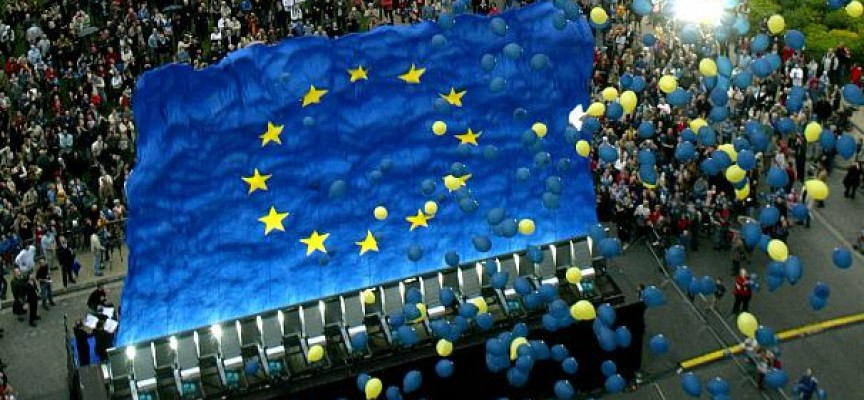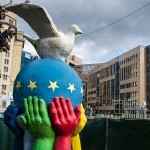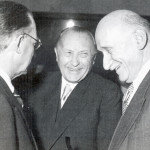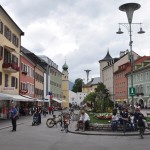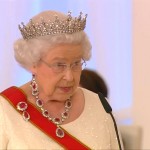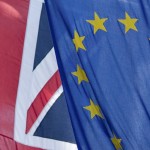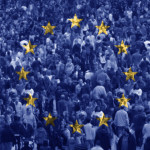“Europe was not achieved and we had war”. So Robert Schuman on May 9th, 1950.
The Second World War had finished just five years before, the First had started in 1914. Between the beginning of the First and the end of the Second there was a period that Raymond Aron called “the war of the 30 years of the 20th century”.
During this timeframe was intensified in all European states excessive adherence to the nation who saw in the stranger the enemy to be killed. Borders became the most obvious sign of this preclusion to others and they were described as “sacred”.
Nationalisms were born: Bolshevism, Francoism, fascism and Nazism. War, blood, massacres, hardness, cruelty were no longer subject to deprecation, but became a necessary means to achieve the “beauty” of the war.
At the end of the dreadful Second World War, the idea of European unity, dreamed of for centuries, came out from the clouds where it had been exiled from dictatorships.
Gradually the first community – the CECA – that put together the production of iron and coal, at that time the raw materials for the lethal weapons of war, would be transformed into an economic one – the EEC – gradually to reach the final goal: the political unity of Europe.
To achieve this goal, nation-states would have to cede some of their sovereignty to the supranational body, thereby recognizing their character as no longer absolutist. “[Europe] will be built through concrete realizations which create first of all a de facto solidarity”.
The beginning was marked by a strong building commitment. Great was the enthusiasm to build a community of peoples who would be brothers in solidarity, a vital germ to give a meaning to their union.
But with time passing, the word “solidarity” was replaced by “common market”, “single market”.
In mid-1993, the recession seemed to compromise the prospects of the economy. Inflation increased mainly because of the decreased production of Germany and the reluctant attitude of Bonn government to reduce interest rates. The word “solidarity” was replaced by “free market”, “competitiveness”, “innovation”.
Later solidarity sank even more, and then we began to speak of “rigor” and “discipline”.
Over time, the world economic crisis struck also Europe: finance absorbed economy and this one politics. The economic crisis put under accusation the liberal policies and economic well-being died out.
Economy and finance awakened nationalisms loading them with resentment as they determined a hierarchy between the different countries by rewarding the most efficient and penalizing the others.
Then increased skepticism, which came from an extremely critical attitude that in our days has resulted in different forms of nationalism, sometimes tinged with populism and xenophobia.
The supranational Schuman thought about was not a denial of the nation. It “will be the first concrete foundation of a European federation indispensable to the maintenance of peace”. You had to protect the identity of the member states, while limiting the power in matters that until now are too unimportant and secondary.
The supranational helped rediscover local identities, which had disappeared during the dictatorships that homologated everything. Thanks just to the supranational spirit, local cultures, rich of traditions peculiar to each one of them, were regenerated: the Bretons, the Corsicans, the Alsatians, the Flemish and the Walloons, the Welsh and the Scots, the Basques and the Catalans enriched Europe with their diversity, thus achieving unity in diversity.
But some differences have become narrow localisms and resulted in folkloric events which have nothing to do with the history of a people. “Europe, spiritual and cultural community” of which Robert Schuman spoke, has transformed over time into a mere geographical territory and its design has weakened.
Once solidarity and the spiritual design of Europe failed, the democratic participation of citizens passed away.
Citizens are outraged when the supranational dynamic is asphyxiated by the intergovernmental approach. Citizens are offended when they are considered only consumers of economic recipes and not actors of the integration process. Citizens feel betrayed by the lack of greater boldness, strong ideals, of durable foresight to bring back hope in a politically united Europe.
To this resignation Europeans must react with new ideas and broad visions. We all feel the need for an awakening of latent energies especially among young people. We all want to reappropriate of the destinies of Europe.
Pope Francis expressed this well during his visit to the European Parliament, when he asked to give hope to Europe recognizing the centrality of the person, and to invest in education, in aid to families, in dealing with the migration issue, in an effort to protect creation, in a word to “rediscover the good soul of Europe”.
Only then a whole new story will be able to start, and the most decisive phase of it: the one invoked by Robert Schuman sixty-five years ago. The future way of Europe is completely to be started. Christians take up their sandals, bag and stick to resume this journey together with all the women and men who believe in peace, in solidarity and human dignity.
“L’Europa non è stata fatta: abbiamo avuto la guerra”. Così Robert Schuman il 9 maggio 1950.
La seconda guerra mondiale era terminata da appena cinque anni, la prima era iniziata nel 1914. Tra l’inizio della prima e la fine della seconda s’interpose un periodo che Raymond Aron definì “la guerra dei 30 anni del XX secolo”.
Durante questo spazio temporale s’intensificò in tutti gli stati europei una eccessiva adesione alla nazione che vedeva nello straniero il nemico da abbattere. Le frontiere divennero il segno più evidente di questa preclusione verso gli altri e venivano definite “sacre”.
Nacquero allora i nazionalismi: il bolscevismo, il franchismo, il fascismo e il nazismo. La guerra, il sangue, le stragi, le durezze, la crudeltà non furono più oggetto di deprecazione, ma divennero mezzo necessario per raggiungere la “bellezza” della guerra.
Alla fine dell’atroce secondo conflitto mondiale, l’idea dell’unità dell’Europa uscì dalle nubi in cui era stata esiliata dalle dittature e sognata per secoli.
Gradualmente – la prima comunità – la CECA – che metteva assieme la produzione di ferro e di carbone, a quei tempi materie prime per le micidiali armi di guerra, si sarebbe trasformata in economica – la CEE – per giungere gradualmente alla meta finale: l’unità politica dell’Europa.
Per giungere a questo traguardo, gli stati-nazione avrebbero dovuto cedere all’organismo sovranazionale parte della loro sovranità, riconoscendo in tal modo il loro carattere non più assolutistico. “[L’Europa] sorgerà da realizzazioni concrete che creino anzitutto una solidarietà di fatto”.
L’inizio fu caratterizzato da un forte impegno costruttore. Grande era l’entusiasmo per costruire una comunità di popoli affratellati nella solidarietà, germe vitale per dare un senso alla loro unione.
Ma la parola “solidarietà” col tempo venne sostituita da “mercato comune”, “mercato unico”.
A metà del 1993 la recessione sembrò compromettere le prospettive dell’economia. L’inflazione aumentò soprattutto a causa della diminuita produzione tedesca e per la reticenza del governo di Bonn a ridurre i tassi d’interesse. La parola “solidarietà” venne sostituita da “libero mercato”, “competitività”, “innovazione”.
La solidarietà, più tardi, si inabissò ancor di più e allora si incominciò a parlare di “rigore” e di “disciplina”.
Col tempo, la crisi economica mondiale si abbatté anche sull’Europa: la finanza assorbì l’economia e questa la politica. La crisi economica mise sotto accusa le politiche liberiste e venne a mancare il benessere economico.
L’economia e la finanza risvegliarono i nazionalismi caricandoli di rancore poiché determinarono una gerarchia tra i diversi paesi premiando i più efficienti e penalizzando gli altri.
Aumentò allora lo scetticismo, subentrato da un atteggiamento eccessivamente critico che ai nostri giorni è sfociato in forme diverse di nazionalismo, venato talvolta di popolismo e di xenofobia.
La sovranazionalità a cui pensava Schuman non era la negazione della nazione. Essa “costituirà il primo nucleo concreto di una federazione europea indispensabile al mantenimento della pace”. Si doveva salvaguardare l’identità degli stati membri, limitandone al contempo il potere in materie che fino ad ora sono troppo ininfluenti e secondarie.
La sovranazionalità contribuì a riscoprire le identità locali, che erano scomparse durante le dittature che tutto omologarono. Grazie proprio allo spirito sovranazionale si rigenerarono le culture locali, ricche ognuna di peculiari tradizioni: i bretoni, i corsi, gli alsaziani, i fiamminghi e i valloni, i gallesi e gli scozzesi, i baschi e i catalani, arricchirono l’Europa con le loro diversità, realizzando così l’unità nella pluralità.
Ma certe diversità sono divenute angusti localismi e sono sfociate in folcloristiche manifestazioni le quali nulla hanno a che fare con la storia di un popolo. “L’Europa, comunità spirituale e culturale” di cui parla Robert Schuman, si è tramutata col tempo in mero territorio geografico e il suo disegno si è affievolito.
Venuta meno la solidarietà, venuto meno il disegno spirituale dell’Europa, venne a mancare la partecipazione democratica dei cittadini.
Sono oltraggiati i cittadini quando la dinamica sovranazionale è asfissiata dall’approccio intergovernativo. Sono offesi i cittadini quando sono considerati solo consumatori di ricette economiche e non attori del processo d’integrazione. Si sentono traditi i cittadini dalla mancanza di maggiore audacia, di saldi ideali, dalla durevole lungimiranza per far ritornare la speranza in un’Europa unita politicamente.
A questa rassegnazione gli europei devono reagire con nuove idee e ampie visioni. Tutti sentiamo il bisogno di un risveglio soprattutto delle energie latenti tra i giovani. Tutti vogliamo riappropriarci dei destini dell’Europa.
Esprimeva bene tutto ciò Papa Francesco che nella sua visita al Parlamento Europeo chiedeva di dare speranza all’Europa riconoscendo la centralità della persona e di investire in educazione, in aiuto alle famiglie, nell’affrontare assieme la questione migratoria, nello sforzo per custodire il creato, in una parola nel “riscoprire l’anima buona dell’Europa”.
Solo così potrà iniziare così una storia tutta nuova, la fase più decisiva: quella invocata da Robert Schuman sessantacinque anni fa. Il cammino futuro dell’Europa è tutto da iniziare. I cristiani prendano sandali, bisaccia e bastone per riprendere questo cammino assieme a tutte le donne e gli uomini che credono nella pace, nella solidarietà e nella dignità umana.
Qu’est-ce qu’il reste de la solidarité?
“L’Europe n’a pas été faite : nous avons eu la guerre”. Ce sont les paroles de Robert Schuman le 9 mai 1950.
La Seconde Guerre mondiale était terminée depuis cinq ans à peine, et la Première avait éclatée en 1914. Entre le début de la Première et la fin de la Deuxième il y a eu une période que Raymond Aron appela “La guerre des trente ans du XX siècle”.
Pendant cet espace temporel, tous les pays européens développèrent une excessive adhésion au concept de nation qui considérait l’étranger l’ennemi à abattre. Les frontières devinrent le signe le plus évident d’une fermeture envers les autres, et pour cela elles étaient définies “sacrées”.
Les nationalismes naquirent : le bolchevisme, le franquisme, le fascisme et le nazisme. La guerre, le sang, les massacres, la rigueur, la cruauté ne furent plus objet de désapprobation, mais ils devinrent le moyen nécessaire pour aboutir à la “beauté” de la guerre.
Après les atrocités de la Seconde guerre mondiale, l’idée de l’unité de l’Europe, toujours rêvée, sortit de l’exil où elle avait été contrainte par les dictatures.
Progressivement, la première communauté, la CECA, qui réunissait la production de fer et de charbon, á cette époque matières primaires pour les armes de guerre, se transforma en communauté économique, la CEE, pour ensuite rejoindre sa destination finale, l’unité politique d’Europe.
Pour atteindre cet objectif les états-nations auraient dû céder une partie de leur souveraineté à l’organisme sur-national, en reconnaissant ainsi leur physionomie non plus absolutiste.
“[L’Europe] surgira de réalisations concrètes qui créent d’abord une réelle solidarité”.
Un très fort engagement caractérisa le début. Avec un grand enthousiasme on voulait construire une communauté de peuples unis dans la solidarité, première graine pour donner du sens à cette union.
Mais, avec le temps, le mot “solidarité” a été remplacé par “marché unitaire” et “marché unique”.
Dans la moitié du 1993 la récession sembla compromettre les perspectives économiques. L’inflation crût à cause de la baisse de la production allemande et à cause de la réticence de Bonn à réduire les taux d’intérêt. Le mot “solidarité” fut remplacé par “marché libre”, “compétitivité” et “innovation”.
Ensuite, la solidarité s’enfonça encore plus et on commença à parler de “rigueur” et de “discipline”.
La crise économique s’abattit même sur l’Europe : la finance absorba l’économie et, celle-ci, la politique. La crise économique accusa les politiques libéristes, et le bienêtre économique vint à manquer.
L’économie et la finance réveillèrent les nationalismes, en déterminant une hiérarchie parmi les pays, qui favorisait les plus efficaces et pénalisait les autres.
Le scepticisme augmenta, remplacé par une attitude extrêmement critique qui, à nos jours, s’est transformée dans un certain nationalisme, parfois populisme ou même xénophobie.
La supranationalité, dont Schuman rêvait, n’était pas la négation de la nation. Cette proposition “réalisera les premières assises concrètes d’une Fédération européenne indispensable pour préserver la paix”. Il fallait sauvegarder l’identité des états membres, en limitant au même temps leur pouvoir dans certains contextes que, jusqu’à ce moment-là, étaient insignifiants et secondaires.
La supranationalité aida à redécouvrir les identités nationales, qui étaient disparues pendant les dictatures uni-formatrices. Grace à l’esprit supranational, les cultures du territoire, riches en traditions particulières, se régénèrent : les bretons, les corses, les alsaciens, les flamandes et les vallons, les gallois et les écossais, les basques et les catalans, enrichirent l’Europe grâce à leurs diversités en réalisant ainsi l’unité dans la diversité.
Et pourtant certaines diversités sont devenues des particularismes exigus, et elles ont de même abouti à des manifestations folkloriques qui n’ont rien à voir avec l’histoire d’un peuple. L’Europe, “communauté spirituelle et culturelle”, comme l’appelait Schuman, s’est transformée en simple territoire géographique dont les contours vont disparaitre.
Quand le principe supranational est étouffé par une approche intergouvernementale, ce sont les citoyens à être outragés, offensés parce qu’ils sont considérés seulement des consommateurs de recettes économiques et non pas des acteurs dans le processus d’intégration. A cause du manque d’audace et de la prévoyance nécessaire pour relancer l’espoir dans une Europe unie politiquement, les citoyens se sentent trompés.
Les européens sont appelés à réagir à cette résignation avec des nouvelles idées et une vision plus large. Nous tous nous ressentons le besoin d’un réveil d’énergies, surtout parmi les jeunes. Nous tous nous voulons nous ré-approprier des destins de l’Europe.
Tout cela a été bien exprimé par le Pape François, lors de sa visite au Parlement européen, quand il a demandé à l’Europe de donner plus d’espoir à l’Europe, en reconnaissant la centralité de la personne et la nécessité d’investir dans l’éducation, l’aide aux familles, la question migratoire, l’effort dans la protection de la création : dans un mot, “que l’Europe redécouvre sa bonne âme”.
C’est ainsi qu’une nouvelle phase, la décisive, pourra commencer, celle évoquée par Robert Schuman il y a soixante-cinq ans. Il faut encore commencer le futur chemin de l’Europe .Que les chrétiens prennent les sandales, la gourde et le bâton pour reprendre ce chemin avec tous les hommes et les femmes qui croient dans la paix, la solidarité et la dignité humaine.
Edoardo Zin
Latest posts by Edoardo Zin (see all)
- 60° Treaties of Rome: a Europe that struggles and hopes - 19 marzo 2017
- Europe lacks the great politics - 28 dicembre 2016
- The strength of Robert Schuman - 30 aprile 2016

